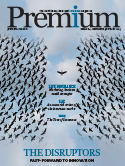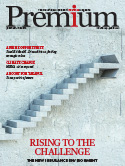Baden Baden: Dealing with disruption

Leading industry practitioners explored an expansive range of topics under the overarching theme of disruption at the Reinsurance Symposium in Baden Baden this year. The main theme of the event was ‘Profiting from Disruption’ with tangents including the primary disruptive drivers impacting the insurance market, how the industry must transform if it is to respond effectively, the challenges and opportunities generated by insurtech and the evolving relationship between capital and risk.
James Nash, president, International, Guy Carpenter, acknowledged that disruption is not a new phenomenon for the (re)insurance market, but highlighted two themes that have fundamentally altered the overall market dynamic.
Firstly, the capital structure of the industry has changed and, following recent major losses, it is now waiting to see whether the financial markets can deploy capital quickly post event. He said, “If the theory plays out in practice, those participants waiting for the market to react with rationing and significantly higher prices will no longer be ensured survival. For them to survive, they need to find new and better ways of doing business.” Secondly, he stated that the pace and diversity of change that we are experiencing “are disrupting the established order”.
However, he added that amid this ever-changing environment two facts remain constant. “First, people and organisations will always want to protect their assets by laying off risk to others. Second, there will always be those with the capital willing to assume that risk. In between and around these poles everything is subject to change.” He concluded: “To manage disruption effectively and to grasp the opportunities it creates, we must look to identify, evaluate and package risk in a more intelligent manner.”
According to Dr. Joachim Wenning, chairman of the Board of Management, Munich Re, disruption in the insurance sector will primarily be driven by data analytics and technology; however, he added that for the industry to fully capitalise on the potential these drivers create, it must transform.
“I believe there is substantial value creation potential in the future,” he said. “However, disruption does not automatically bring opportunities, we have to earn them. We won’t be able to capture this potential without transforming our industry and without extending our business models, for example, into risk prevention and risk mitigation. And we have to move fast to drive the transformation of our industry ourselves before others do. Munich Re is determined to actively shape our industry and to remain a forerunner in offering innovative, digital solutions to her clients.”
Adrian Jones, head of Strategy & Development, SCOR Global P&C, told delegates that they themselves would drive disruption by grabbing hold of the innovative capabilities at their disposal.
He said: “For insurers and reinsurers, the most likely disruptor is either you yourself or a competitor you’ve always known about. Insurers can disrupt themselves by reinventing the customer experience. Reinsurers have to adapt to handle rising global aggregations of risk, which will require large-scale expertise across lines of business and geographies, all for the benefit of clients and brokers.”
In the final presentation of the Symposium, Luca Albertini, chief executive officer and founding partner, Leadenhall Capital Partners, addressed the disruptive impact of capital flow within the insurance industry, describing such flows as “agents for change”.
He informed delegates: “The recent catastrophe events have demonstrated that ILS investors are in this space in a mature way and are here to stay; but not at any price. Investors need to see an acceptable long-term return for their investments, accepting losses, but seeking payback as well.”





































